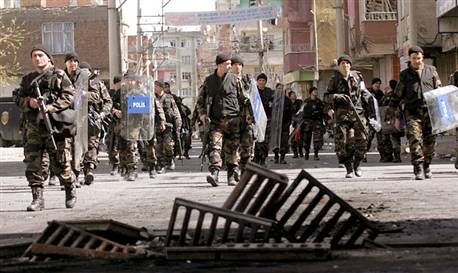 By Owen Matthews and Sami Kohen
By Owen Matthews and Sami Kohen
Newsweek International
July31, 2006 issue - Israel launched airstrikes on Lebanon in response toattacks by Hizbullah earlier this month, and George W. Bush called it"self-defense." But what to tell the Turks, who over the last week lost15 sol-diers to terror attacks launched by sepa-ratist Kurds fromneighboring Iraq?
 |
| Mustafa Ozer / AFP-Getty Images |
ManyTurkish leaders are pressing for cross-border tactical air assaults onthe guerrillas. But Bush, fearing yet another escalation of the MiddleEast's violence, urged Prime Minister Recep Tayyip Erdogan to hold off."The message was, unilateral action isn't going to be helpful," says asenior U.S. official, describing the 15-minute phone conversation. "Thepresident asked for patience."
And so Turkish forcesare holding fast--for now--in deference to their half-century alliancewith the United States. But that patience is bound to be challenged,probably sooner than later. Domestic political pressures are buildingto take a leaf from Israel's book and hit back at the guerrillas of theKurdistan Work-ers' Party, or PKK. Since the beginning of the year,attacks on Turkish military garrisons and police stations haveesca-lated across the country's southeast, along with random shootings,bombings and protests•many of them, authorities suspect, organized inIraq. Already the Turkish military has laid detailed plans for possiblehelicopter-and-commando assaults, government sources tell NEWSWEEK.Meanwhile, Ankara's frustration with Washington has grown palpable. Forall the Bush administration's repeated promises to crack down on thePKK, little if anything has happened. With elections coming next year,Erdogan could be pardoned for soon concluding that his forbearancemight prove politically dangerous. "Moderate, liberal people in Turkeyare becoming increasingly anti-American," warns Turkey's ForeignMinister Abdullah Gul. "That isn't good."
Erdogan has built acareer on skillfully riding populist waves, and he's not going to missthis one. On the one hand, he recognizes the importance of maintaininggood relations with America, if only to foil critics who lambaste himfor being too Islamist. On the other, popular anger at the PKK isgetting explosive. At the funeral of a murdered soldier in Izmir lastweek, crowds destroyed wreaths sent by Erdogan's Interior MinisterAbdulkadir Aksu and the city's governor, Oguz Kaan Koksal. Somemourners chanted slogans accusing the government of cooperating withthe PKK. And when a group of 60 human-rights activists were arrested inthe resort of Kiyikoy on suspicion of being PKK sympathizers last week,locals attacked the detainees with stones and iron bars.
TheTurkish press has been baying for action, with even the solidlypro-American Turkish Daily News railing in an editorial that "Turkey isno banana republic that can leave its security to the mercy of others."Another editorial posed the question more directly. "Why is it thatIsrael has the right to 'self-defense'," the paper asked, "and notTurkey." The country's usually fractious parliamentary opposition, in arare moment of unity, called for active intervention. "Opposition,"says True Path Party leader Mehmet Agar, "ends at Habur" -- Turkey'sborder crossing with Iraq.
Can Washington keep the lid on thisbubbling pot? Not for long, many experts fear. Despite past assurances,the U.S. military has been unwilling or unable to mount operationsagainst the guerrillas. With its hands full elsewhere, Washington canrealistically offer little more than in-telligence-sharing, coupledwith possible measures to cut off PKK funding. That's just not enough,says a senior Erdogan aide: "We want action, not words." Nor can theTurks expect much from the Iraqis. "We will not tolerate any terroristgroups on the territory of Iraq," Iraqi Foreign Minister Hoshir Zebaritold NEWSWEEK. But even he acknowledges that it may be a while beforethe government's security forces get around to dealing with the PKK. Bycontrast, Iran last week began shelling PKK positions around KandilMountain on northern Iraq's Iranian and Turkish border. PresidentMahmoud Ahmadinejad also called Erdogan to assure him of Teh-ran'swillingess to help quell the guerrillas --unlike the United States.
Thiswon't automatically lead to another front in the region's wars. For allthe clamor for a military strike, "the sane members of the TurkishGeneral Staff are aware of the costs of going into northern Iraq," saysindependent analyst Grenville Byford. Those include possible all-outcivil disorder across Turkey's Kurdish southeast provinces--which, ifrioting this spring is anything to go by, would lead to a brutalcrackdown, hurting Ankara's hopes for joining the EU. "There is no goodway out of this for the Turkish government," says Byford.
Allthis comes at a bad time, clearly. Turkey could play a key diplomaticrole in dealing with the burgeoning crisis in southern Lebanon, NATOofficials say, especially if Turkey were willing to provide troops tothe sort of international force being promoted by France and otherEuropean leaders, including Tony Blair. Not only are Turks Muslims,which should reduce frictions with the local population, but Ankaraalso enjoys good working relations with many of the countries andforces active behind the scenes. As one of Damascus's few friends inthe region, for example, Ankara would be in a good position to rein inSyrian ambitions in Leba-non. Erdogan has been trying to play the roleof mediator with Iran, Israel and the Palestinians as well--preciselywhy Turkey would "encourage and support" an international peacekeepingforce, says Foreign Ministry spokesman Namik Tan.
Objectively,Turkey knows that it has no real option but to remain within theWestern Alliance. As for Erdogan himself, who has pushed through somany dramatic reforms to win membership in the European Union, he, too,will be reluctant to break with the West, however sorely provoked bythe PKK. Still, if attacks continue to the point where his politicalsurvival is at stake, that sense of restraint could abruptly give way.Last week rumors swirled in Ankara and Istanbul that he was close tosuch a move. For the United States and others, the diplomatic challengeis to help save Erdogan from having to make such a choice. If theyfail, the next occasion may require more than a phone call from Bush.
© 2006 Newsweek, Inc.


